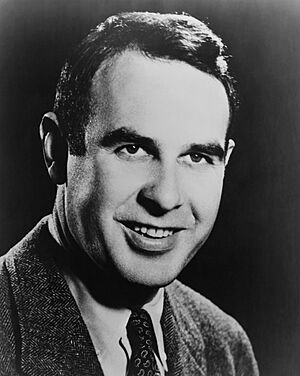Harrison A. Williams facts for kids
Quick facts for kids
Pete Williams
|
|
|---|---|

Williams in 1955
|
|
| United States Senator from New Jersey |
|
| In office January 3, 1959 – March 11, 1982 |
|
| Preceded by | H. Alexander Smith |
| Succeeded by | Nicholas F. Brady |
| Member of the U.S. House of Representatives from New Jersey's 6th district |
|
| In office November 3, 1953 – January 3, 1957 |
|
| Preceded by | Clifford P. Case |
| Succeeded by | Florence Dwyer |
| Personal details | |
| Born |
Harrison Arlington Williams Jr.
December 10, 1919 Plainfield, New Jersey, U.S. |
| Died | November 17, 2001 (aged 81) Denville, New Jersey, U.S. |
| Political party | Democratic |
| Spouses | Nancy McGlone (divorced) Jeanette Smith |
| Children | 4 |
| Education | Oberlin College (BA) Georgetown University Columbia University (LLB) |
| Military service | |
| Allegiance | |
| Branch/service | |
| Years of service | 1941–1945 |
| Rank | Lieutenant |
| Unit | United States Navy Reserve |
| Battles/wars | World War II |
Harrison Arlington "Pete" Williams Jr. (December 10, 1919 – November 17, 2001) was an American politician and lawyer. He was a member of the Democratic Party. He served as a representative for New Jersey in the United States House of Representatives from 1953 to 1957. Later, he became a U.S. Senator for New Jersey, serving from 1959 to 1982. Williams had to leave his position in the Senate early due to serious issues that came to light.
Contents
Early Life and Education
Harrison "Pete" Williams Jr. was born in Plainfield, New Jersey. After high school, he went to Oberlin College and graduated in 1941. He then worked for newspapers in Washington, D.C..
During World War II, Williams joined the United States Naval Reserve in 1941. He became a pilot for the Navy and served until 1945. After the war, he studied law at Columbia Law School and became a lawyer in 1948. He practiced law in both New Hampshire and his home state of New Jersey.
Political Career
Williams first entered politics by running for local offices in New Jersey, though he was not successful at first.
Serving in Congress
In 1953, Pete Williams was elected to the United States House of Representatives. This is where laws are first discussed and created. He served there for a few years.
Later, in 1958, he was elected to the United States Senate. The Senate is the other part of the U.S. Congress, and senators represent their entire state. Williams was re-elected three more times, making him the first Democrat from New Jersey to be elected to the Senate four times.
As a senator, Williams worked hard on many important laws. He focused on helping people and improving cities.
- He helped create the Employee Retirement Income Security Act. This law helps protect the money people save for their retirement.
- He played a big part in the 1969 Coal Mine Safety and Health Act. This law made coal mines safer for workers.
- He also helped create the Occupational Safety and Health Administration (OSHA). OSHA sets rules to make sure workplaces are safe and healthy for everyone.
- Williams was important in passing the Urban Mass Transportation Act of 1964. This was the first federal law to give money to states and cities for public transportation like buses and trains.
- He also led the United States Senate Special Committee on Aging for several years, focusing on issues important to older Americans.
- In 1968, he sponsored the Williams Act. This law helps regulate how companies buy other companies, making sure it's fair.
End of His Time in Office
In 1981, Pete Williams faced serious charges related to his actions as a senator. Because of these issues, he decided to leave the Senate in 1982. He was later sentenced to time in prison. After his release, he continued to be involved with a halfway house, helping others.
The Metropark train station in New Jersey had been named after him in 1979 because of his support for its construction. However, his name was removed from the station after the issues he faced.
Later Life and Death
After his time in politics, Williams lived in Bedminster Township, New Jersey. He passed away on November 17, 2001, at the age of 81, due to cancer and heart problems.
See also
- List of American federal politicians convicted of crimes
- List of federal political scandals in the United States
- List of United States senators expelled or censured
 | Janet Taylor Pickett |
 | Synthia Saint James |
 | Howardena Pindell |
 | Faith Ringgold |

